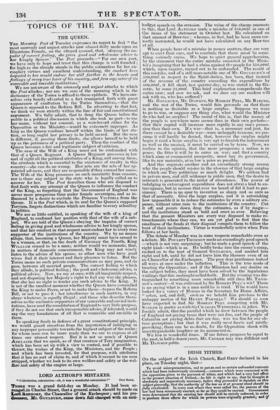LORD .ALTHORPS MISTAKES.
• ". Calculation, calculation—oh, it was a wonderful calculation!" OLD SONO.
THERE was a grand field-day on Monday. It had been ar- a-anged.in Charles Street, that a general attack should be made on .1Lord_Aursoap, the Chancellor of the Exchequer ; and his pre- ilecesnor, _Mr. GOULBURN, came down full charged with an anti- 1 budget speech on the occasion. The value of the charge attionnts to this, that Lord ALTHORP made a mistake of 350,000/. in one of the items of his statement in October last. He calculated on that amount of Beer-tax ; whereas, in fact, had he been more cor- rectly instructed, he would not have calculated on any Beer-tax at all.
When people hear of a mistake in money matters, they are very apt to erect their ears, and to conclude that there must be some- thing seriously amiss. We hope to quiet general apprehension, by the statement that the entire mistake ,consisted in the Minis- ter's imagining that he had a claim against thl people for 350,000/. which, upon inquiry, turned out to be unfounded. The result of this mistake, and of a still more notable one of Mr. GOULBURN'S of - 500,0001. in respect to the Spirit-duties, has been, that instead of the revenue of the country exceeding the expenditure by 500,0001., it fell short, last quarter-day, as was stated in the Ga- zette, by some 25,000/. This brief explanation comprehends the entire case; and now we ask, and we dare say our readers will ask with us, who has suffered ?
Mr. GOULIIITRN, Mr. DAWSON, Sir ROBERT PEEL, Mr. BARING, and the rest of the Tories, would fain persuade us that there is nothing so desirable as a large surplus. Suppose we were to go to war, or suppose any thing else, what would the Minister do who had no surplus? The moral of this is, that the money of the people is anywhere more secure than in their own pockets— that their capital will increase more rapidly in any one's posses- sion than their own. If a war—that is, a necessary and just, for there cannot be a desirable war-:--were unhappily to ensue, we pre- sume it will hardly be denied, that, however the surplus might begin it (and a large surplus is very apt to furnish the inducement as well as the means), it must be carried on by taxes. Now, we incline to the opinion, that the more prosperous a nation is in peace, the fitter it will be to enter on war; and that a countly which aims at commercial prosperity, must buy its government, like its raw materials, at as low a price as possible. And this suggests another and an exceedingly strong reason why the people should rejoice in the absence of that large surplus in which our Tory politicians so much delight. We seldom find in private men, and still seld.omer in public men, that the desire to retrench is generated in the midst of abundance. The power of indulging in extravagant expenditure does not always lead to ex- travagance, but in no case that ever we heard of did it lead to par- simony. There is no spur to invention so sharp and so sure as that of necessity. Give the large surplus, and it is astonishing how impossible it is to reduce the estimates by even a solitary six- pence, without utter ruin to the institutions of the country. Cut it off, and presto down drop the estimates, as if by magic— and the institutions stand as bold and erect as ever. Believing that the present Ministers are every way disposed to make re- trenchments where they can, we are yet glad to find that the smallness of the funds at their disposal compels them to follow the bent of their inclinations. Virtue is wonderfully active when Fate follows at her heels.
The debate of Monday was in some respects remarkable even as a debate. Mr. PouLETT THOMSON made an exceedingly good speech —which is not very surprising; but he made a good speech of the right kind—which is so. He boldly broke into the enemy's camp, rushed on to the tent of General GOULBURN, and mauled him right and left, until he did not leave him the likeness even of an ex-Chancellor of the Exchequer. The poor dear gentleman looked all ways at once under the infliction. This is the true mode of . treating the Opposition; and if the Ministers had any doubts on the subject before, they must have been solved by the lugubrious wailings that this onslaught called forth. But the evening was dis- tinguished by something more remarkable still than Mr. THOM- soN's oratory—it was enlivened by Sir ROBERT PEEL'S wit! There is no saying what is in a man until he is tried. Who would have looked for a votary of Momus in the Secretary for Home Affairs, " sober, sad, and dull," such as we beheld him previous to the unhappy motion of Sir HENRY PARNEI.L ? We should as soon have expected to find Sir ROBERT PEEL competing with Mr. SADLER in poetry as with Sir CHARLES WETHERELL in jokes. We frankly admit, that the parallel which he drew between the people of England not paying taxes that were not due, and the people of Columbia not paying debts that are due, was too fine for our ob- tuse perceptions; but that it was really most facete and mirth- provoking, there can be no doubt, for the Opposition shook with unextinguishable laughter on its annunciation. We live in wonderful times. If our future progress be equal to the past, in half-a-dozen years, Mr. CROKER may wax diffident and Mr. DAWSON polite.


























 Previous page
Previous page